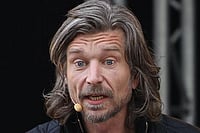Last week I was stuck in a particularly dreadful spot of traffic in the Mumbai suburb of Bandra West. I was sitting in an auto-rickshaw, all sides open, not moving at all, with vehicles of all sorts inches away from me. From the rickshaw near me, I heard a man with an ambiguously international accent say, “I don’t think the role is really challenging. But I would still love to work with him, of course.”
I poked my head out to see who was having this conversation and found an effete young man wearing tight dark jeans, multi-coloured sneakers, a non-descript T-shirt and thick-rimmed spectacles. The uniform of many young people who have made Bandra their home.
When I moved back to India in 2007, I had already been hearing about this special neighbourhood. I had never been to Mumbai and didn’t know a single person when I first got here. I moved in with a friend of a friend— an Indian Scottish journalist— who took me out to a little bar called Zenzi on my first weekend. Over the next year or so, nearly all the new friends and acquaintances I met were through Zenzi. For many of us— Indians from abroad or other parts of India, and expats, Zenzi was the one place in a complicated, manic mega city where everyone knew your name. The bar was laid-back and casual and run by an imposing Dutchman who was dating an former Indian model and had an even more imposing large Doberman with him at all times.
Back then, there weren’t many of us— it was a small group of travellers— artists, Mahindra interns, young bankers and entrepreneurs from all over India and the world— with common interests who had somehow managed to find each other in this little suburb of Mumbai. The expats were largely from the U.S. or France and the Indians were from Delhi, Bangalore, or the U.S. We felt special. Bandra and Zenzi were like a little secret we held close to ourselves wherever we met. We did not witness the gentrification of Bandra. Bollywood had moved in long before us and bungalows were rapidly being replaced with high-rises and real estate prices were already quite high in 2007 but Bandra felt like the first place in India where non-hippy, non-diplomat young creative types from all over the world could find a place. It felt, suddenly, like Williamsburg in New York City or Condessa in Mexico City once had.
India is not an easy country to move to on your own. I was born in Delhi, lived there for many years, speak Hindi, and can handle Marathi but when I first arrived in Mumbai, it was still a mega-city that I couldn’t quite understand how to navigate.
Any person who has travelled through India will tell you that Mumbai is, for the most part, a friendly city. It has its own norms but the citizens of this city welcome outsiders and help them.
The first time I took a local train, I was returning to Bandra from Churchgate at rush hour. I pushed my way into the women’s compartment and got squeezed into the back along the way. I was not sure which stop Bandra was and I did not know which side of the doorless compartment the platform was going to be on. I was worried that I would not make it out at my stop but when Bandra arrived, I made a few mumbling sounds about needing to get off and a sea of women’s hands pushed me through the compartment and out of the door.
Those early months, I explored every corner of the city— I walked through Crawford Market, ate on Muhammad Ali Road, roamed through the bylanes of the red light district of Kamathipura and returned to Bandra, exhausted, safe, and amongst friends. Unlike in Delhi or other parts of India or the world, in Mumbai, I never felt threatened. But I did feel exhausted. It is a bustling, tiring city with its own laws and its own etiquette. For me, part of being a traveler is pushing yourself to your limit for however many days or weeks or months but then returning home. But I had come to make Mumbai my home and even though the people of the city were warm and welcoming, I needed to be able to come back every night to a neighbourhood like Bandra.
But then, thanks to landlord issues, fussy neighbours and other real estate problems, Zenzi closed down. This coincided with my departure from Mumbai. I spent the next two and a half years doing my Masters in New York City and only returned to Mumbai for brief visits. But a few months ago, work brought me to India for an extended period and I decided to make Mumbai my base once again.
Bandra has changed. In 2007, it was easy to spot People Like Us and we all found each other and made friends. We didn’t have too many choices for places to go and we all held on to each other, shiny with happiness about this oasis we had found. Zenzi no longer exists. Too many people know the secret about Bandra now. People Like Us move en masse through the cafes and restaurants of Bandra. We are all young. We have all grown up outside Mumbai, many of us outside India. We are all in the arts. We work at Vogue and GQ. We act, we sing, we dance, we write, we photograph, we code. We direct films, we produce ads, we VJ, and we DJ. In Bandra, we are no longer the small minority. Businesses have sprung up all over this little suburb to cater to our needs.
But nothing like Zenzi exists. Perhaps nothing like Zenzi can now exist. Now there’s Lagerbay (where Zenzi used to be. Nostalgia does not permit me to step in.), Bonobo, The Big Bang, Escobar, and The Daily. There’s a Hakassan, there’s an Indigo Deli. There’s a place called The Yoga House where you can take an expensive yoga class and then have a quinoa salad and a wheatgrass shot and there’s a place called The Art Loft where you can take art therapy classes— presumably after a bad audition or particularly exhausting shoot. There are two Starbucks. There’s Pali Village Café and its Indian sister restaurant, Pali Bhavan. Pali Bhavan charges Rs. 180 for Vada Pav (Rs. 10 on Juhu beach). On a Thursday night, it has a bar night that gets filled to the balcony and the brim with pretty girls in tight dresses and handsome boys who buy them Rs. 700 drinks. I went recently but left soon. It would possibly be a great place to pick up a one-night stand but it certainly didn’t seem like the kind of place to make new friends or catch up with old ones.
Bandra is different now but it’s still magical. Over Christmas week, the neighbourhood sparkled. People of all religions stopped to admire the window display at Damian.
When I returned in November, I felt a bit lost at first. There didn’t seem to be the same sense of community that I found when I first moved here in 2007. I had too many options. But I found my old clusters of friends. I haven’t made too many new ones this time around but many of those from when I left are still here and now we have more options of places to go. And sometimes it’s nice to have anonymity. It’s nice to be able to go for a meal alone with a book and not know four other people in the restaurant. This time around, I’ve found a quiet café to write in and there’s a new gym meters away from my apartment that has classes that suit me perfectly. A few weeks ago I attended an event called Live From the Console at Mehboob Studios. The near-monthly event hosted by Sony Music takes over a huge cavernous film studio in Bandra for an evening of film screenings and live music. Five years ago, an event like this would not attract enough people to be financially viable. Now, the studio was filled and I didn’t know anyone there apart from the person I had gone with but I did get the chance to see the small Gujarati film, The Good Road, that is India’s submission to the Oscars this year.
I’m learning new ways to navigate Bandra. In November, I was sceptical. I didn’t think I’d find a home here as easily as I had years ago. Maybe Bandra changed or maybe I changed or, more likely, we both changed and are now being forced to reconfigure our relationship.

























